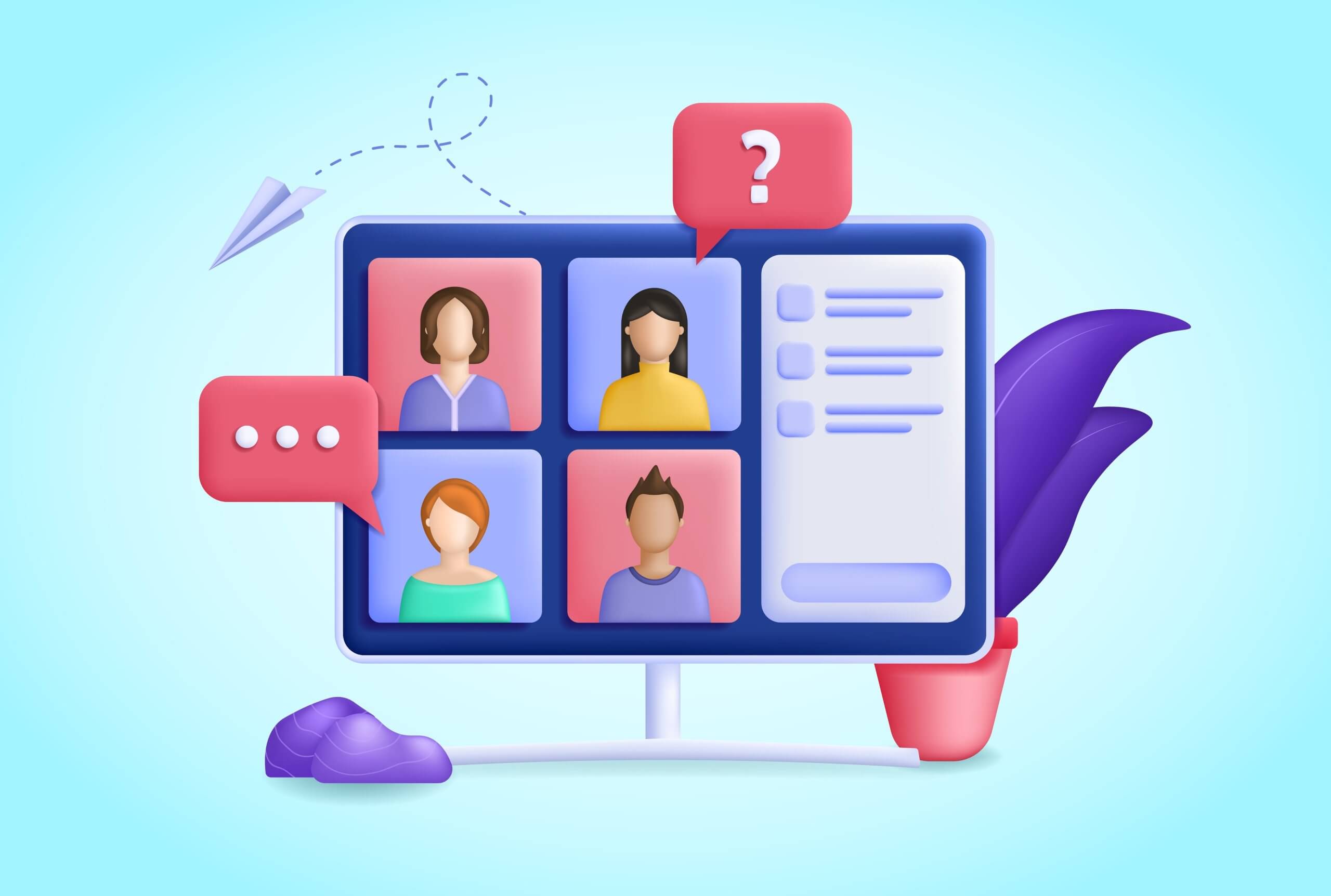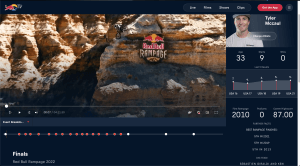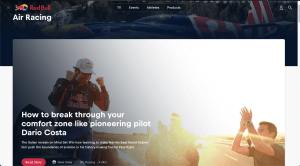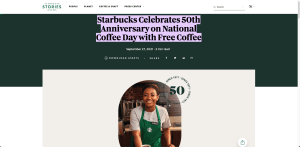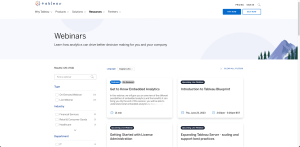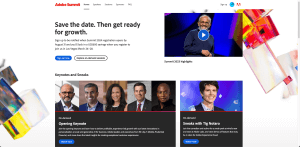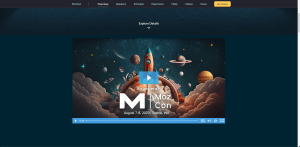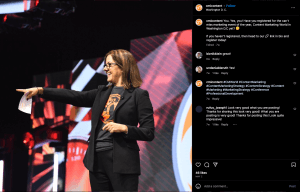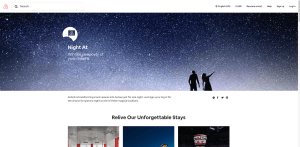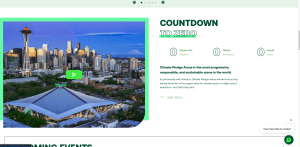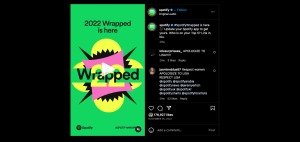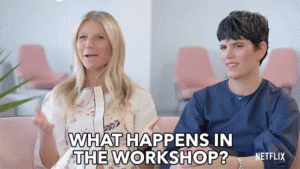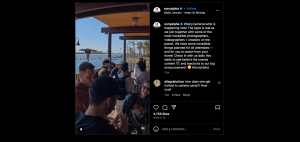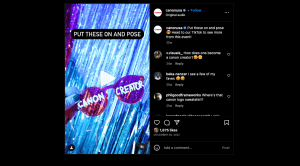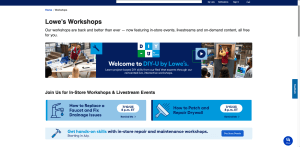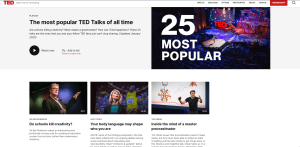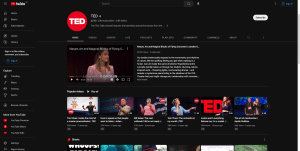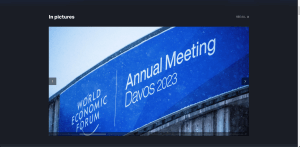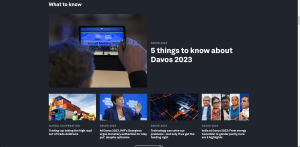Want a heads up when a new story drops? Subscribe here.
Getting your brand, whether B2B or B2C, to the top, requires you to go a little extra. In this guide, we won’t talk about revolutionary or unheard concepts. No. Our subject matter here is something numerous brands have relied on for years. Well… at least until the pandemic hit.
It might have *kinda* lost its sparkle in recent years because of those unforeseen circumstances we are all aware of, but in 2023, we strongly believe it is something we should bring back – event marketing.
Something has been buzzing for a while, and that’s event marketing’s ability to make your brand stand out from the crowd. Nothing beats the thrill of events focusing on face-to-face interactions, where people from various niches meet, exchange knowledge, try new things, and indulge in novel experiences.
Event marketing is a creative and engaging way to bring people together, create brand awareness, and establish lasting relationships with your target audience. It’s a chance to showcase your brand personality and demonstrate your credibility in a fun and exciting way.
Yet, despite it all, many brands host events that go unnoticed, resulting in an empty room and a wasted budget. Or worse, ones only attracting friends, family, and irrelevant audiences. Sending out invitations and keeping your fingers crossed that the right people will show up no longer makes the cut. To host a triumphant event, you need a solid event marketing strategy that covers every aspect, from pre-event promotions to post-event follow-ups.
So, whether you’re planning a trade show, a virtual event, or an in-person workshop, to get something out of it, you should precisely know what you are doing. Luckily, with the increasing reliance on digital marketing, you can excel at your next business event.
How? We are sharing all the secrets in our detailed event marketing guide. We’ll explore the different types of events, the benefits of event marketing, and how to create a successful event marketing strategy. So, sit back, relax, and embrace the journey of taking your event marketing to the next level.
Table of Contents
What is Event Marketing, and How Does it Work?
As usual, let’s start with the basics – what is event marketing? A promotional strategy that involves creating, organizing, and executing an event to promote a product, service, or brand, event marketing has always been the go-to tactic for many brands, especially B2Bs.
What started as a way to showcase a brand’s products or services is now a tool to create an experience that leaves a lasting impression on attendees. Not only does it promote your business, but it also fosters a community that cares and grows alongside you.
But why is event marketing so effective? Psychologically speaking, we can attribute it to the fact that people tend to remember experiences better than advertisements or promotions. So what better way to leave a lasting impression on your target audience, which can later translate into brand loyalty and increased sales?
Moreover, events offer a unique opportunity for all businesses to engage with their audience on a deeper level. Paid promotions and ads might effectively drive short-term sales or traffic, but they lack the personal touch and emotional connection that events can provide.
Investing in events usually offers businesses a unique opportunity for face-to-face interaction, making it an invaluable choice.
Events also provide an opportunity for businesses to showcase their products or services in a more interactive and immersive way. For example, a company selling outdoor equipment can host a hiking or camping event where customers can try out the gear in a real-world setting. This type of experiential marketing (we will cover that in a while) can be much more effective than simply showing a product in a traditional ad or promotion.
Next, suppose a B2B SaaS company is launching a new product or feature. Instead of just promoting it through traditional advertising, they can host a virtual event, demonstrating the product and its benefits to potential customers. Attendees can interact with it in real time and ask questions, leading to a deeper understanding and appreciation of its qualities and functionalities.
Said company can also invite industry experts to speak and share their insights during the event, further establishing the company as a thought leader in its respective field. Such an event can help the company build relationships with potential customers, generate leads, and drive sales.
You see how effective event marketing would be when done, right?
Why Does Your Business Need Event Marketing?
In a world where digital marketing has become increasingly prevalent, event marketing offers a valuable opportunity for businesses to stand out and connect with their audience on a more personal level. Whether you’re looking to launch a new product, build brand awareness, or merely connect with your customers more meaningfully, event marketing can be a powerful tool in your marketing arsenal. So, let’s dive in and discover why your business needs event marketing!
Create Brand Awareness
No matter how big a brand might get, one thing that they should never stop doing is fighting for more brand recognition. There will always be someone that hasn’t heard of you. Someone unaware of what you do, represent, or sell.
Luckily for you, brand recognition is one of the primary benefits of event marketing. Events provide a one-of-a-kind opportunity for businesses to make as much noise as needed and introduce new people to their products and services showcased more engagingly and interactively than usual. After all, the best thing about event marketing is that it allows potential customers to experience the brand firsthand.
Unsure of the brand recognition benefits? Let’s give you an example that will clear the air.
You’ve probably heard of Red Bull. But even if you haven’t, the energy drink company goes above and beyond to promote its beverages by annually throwing different sports events. It is the king of hosting extreme sports events, such as the Red Bull Rampage mountain biking competition and the Red Bull Air Race.
Daredevils and extreme sports enthusiasts are the target audience of the brand. By sponsoring and hosting these and similar events, being the proactive brand it is, Red Bull creates brand recognition within an audience already attending that will be there regardless.
That is how Red Bull can create a strong association between its brand and extreme sports, helping to solidify its position as a leader in the energy drink market.
In addition to large-scale events, smaller, more intimate gatherings are also great for brand awareness. For example, a software company might host a seminar or workshop where attendees can learn about the latest industry trends and network with other professionals.
Cultivate Relationships
A central factor in fostering brand loyalty, hosting events allows you to cultivate long-term customer connections with potential customers, turning them into loyal brand advocates.
One way to cultivate relationships is through customer appreciation events, which, as the name suggests, is about showing your customers gratitude and letting them know how much you value their time and support. The goal is to create an enjoyable and memorable experience for your customers so they feel appreciated and connected to your brand.
For example, in the past, Starbucks hosted a customer appreciation event. That was when they gave away free coffee and offered exclusive discounts to their customers. Who wouldn’t want a free salted caramel cream cold brew to go? Yes, that was oddly specific, but the point is that events like this one create a positive impression of the brand, ultimately building customer loyalty and word-of-mouth marketing.
And while word-of-mouth marketing is an ancient technique, it is a form of earned media you should always strive for.
Another way to cultivate relationships is by hosting industry-specific events. These events bring together professionals from the same industry, allowing them to network, learn from each other, and share ideas. As a business owner, hosting or sponsoring these events can help position your brand as a groundbreaker in your industry and build relationships with potential clients.
Twilio, a cloud communications platform company, hosts an annual conference called SIGNAL. The event brings together developers, industry experts, and thought leaders to discuss the latest trends and best practices in communications technology.
Through SIGNAL, Twilio is able to cultivate relationships with its customers and potential customers, as well as showcase its expertise and thought leadership in the industry. The event also allows Twilio to gain valuable customer feedback and better understand their needs and challenges.
Prove Credibility
Brands wouldn’t invest in hosting events if they didn’t have something valuable to share, right? You will see how much time, effort, skills, and finances go into throwing an event. So why would brands even bother to do all that if it didn’t pay off?
The thing about events is that it gives people the idea that brands are credible and have knowledge or novel experiences they can introduce to the audience. And in most cases, that is correct!
One real-life example of a company that effectively used event marketing to prove its credibility is Tableau, a data analytics and visualization software company. Tableau’s annual conference, Tableau Conference, brings together data enthusiasts from all around, eager to learn about the latest industry trends, attend training sessions, and network with peers.
By hosting this event, Tableau can showcase its expertise in data analytics and visualization fields and establish its credibility as a leader in the industry. Attendees can meet with Tableau employees and experts, learn about the latest products and features, and get hands-on experience with the software.
Another example is the Adobe Summit, an annual event hosted by Adobe Systems for professionals in all kinds of creative fields – photography, design, marketing, etc. With this event, Adobe can demonstrate its industry knowledge and expertise and showcase its popular products and services in action. Attendees can learn from industry experts and thought leaders and gain insights into the latest trends and best practices in designing, illustrating, or video editing.
They also have a very intriguing video on their homepage, showing highlights to get you excited for their next event!
By hosting events like Tableau Conference and Adobe Summit, these companies can prove their credibility and establish themselves as leaders in their respective industries. That can go a long way in building trust with potential customers and ultimately driving sales and revenue for the business.
Optimize Conversion Rates
Product launch events are particularly effective ways to optimize conversion rates. Such events allow businesses to introduce new products or services to potential customers engagingly and memorably. By providing a hands-on experience and allowing attendees to interact with the product, brands can create a buzz and generate excitement around the launch, leading to increased sales.
For instance, Apple’s product launch events have become a legendary example of how event marketing can create hype around a new product. By inviting influential media and industry leaders to an exclusive event, Apple generates widespread media coverage and interest around all new product releases, leading to increased pre-orders and sales.
After all, who doesn’t want to see what is the next thing that will revolutionize the tech industry? Similarly, Samsung now holds annual events before the launch of their flagman phones.
During those pre-launch events, companies can also provide valuable information and insights to attendees on how to best utilize these products, giving them a chance to position themselves as experts in their field.
Knowledge Exchange
As far as event marketing benefits are concerned, we can talk for hours. So let us discuss one last advantage before we continue with the hows and the whats. Let us share our knowledge on this.
Through events like seminars, workshops, or webinars, businesses can offer valuable insights to attendees and build trust and credibility in their brand.
One example of a company that has effectively used knowledge exchange in its event marketing strategy is Moz, a software-as-a-service (SaaS) company that provides search engine optimization (SEO) tools and resources. Moz hosts an annual event called MozCon, where industry experts and company staff share insights, SEO know-how, and digital marketing hacks.
We all know how difficult creating an efficient SEO strategy might be, so, at MozCon, attendees can learn about the latest trends and best practices in SEO. Also, they can use the conference as a platform to network with other professionals in the field.
Another example of efficient knowledge exchange in event marketing is the Content Marketing World conference hosted by the Content Marketing Institute. The conference brings together content marketing professionals to learn from industry experts and share their experiences and insights.
Do you see how you can share your knowledge with the audience?
Event Marketing vs. Experiential Marketing: Is There a Difference?
Wondering if experiential marketing is the same as event marketing? While often used interchangeably, those are, in fact, two terms that do not mean the same thing. Both types of marketing aim to engage customers and create a memorable experience, but they have different approaches and goals.
Event marketing promotes a specific event, such as a trade show, conference, or product launch. The goal is to attract attendees, generate leads, and increase brand awareness. This type of marketing typically involves traditional advertising channels, such as email campaigns, social media posts, and press releases.
On the other hand, experiential marketing is all about creating an immersive and engaging experience for customers. It focuses on creating a connection between the brand and the customer, and the experience often takes place outside of a traditional advertising context. The goal is to build brand loyalty, increase engagement, and create a lasting impression on customers.
Now let us dive into even more detail.
Focus on Event vs. Experience
Experiences vs. Events is the first crucial difference between our two terms. Their focus is different – one prioritizes memorable experiences for the customer, while the other concentrates on the event itself.
Experiential marketing focuses on creating an immersive experience for customers that they will remember and talk about long after the event itself is over. This approach often involves creating a physical environment that engages all senses, with interactive installations, unique performances, and other unexpected elements that build a memorable and emotionally impactful experience.
Here are some examples to complete the picture:
- In 2020, Samsung launched the Galaxy Studio, a virtual event that offered visitors a chance to try out their latest mobile devices and experience a variety of immersive installations.
- Sephora‘s annual beauty convention, Sephoria, is a prime example of experiential marketing. The event features interactive beauty workshops, product demonstrations, and meet-and-greets with beauty influencers. In addition to promoting its products, Sephora aims to create a memorable and engaging experience for its customers.
- In partnership with the Louvre Museum in Paris, in 2019, Airbnb created an experiential marketing campaign, Night At, that allowed one lucky winner and their guest to spend the night inside the museum. The overnight stay included a private tour of the galleries, dinner in a pop-up dining room, and a private concert in the Napoleon III apartments.
On the other hand, event marketing is more focused on the event itself to attract as many attendees as possible. This approach involves creating an event that is appealing to the target audience, with features such as entertainment, giveaways, and interactive displays. The event itself, not the customer experience, is the primary marketing tool marketing experts use with the hope that attendees will share their experiences with others and spread the word about the brand.
Long-term vs. Short-term
Experiential marketing is a long-term strategy that creates more lasting customer relationships. It focuses on engaging customers in interactive experiences that allow them to connect with the brand on a more personal level.
On the other hand, event marketing is a short-term strategy often used to achieve specific marketing goals, such as generating leads, building brand awareness, or promoting a new product.
Experiential marketing campaigns often involve activities, such as immersive installations, pop-up shops, or product demonstrations, that allow customers to engage with the brand more meaningfully.
For example, Amazon‘s The Climate Pledge campaign created a captivating experiential marketing activation called the Climate Pledge Arena. This innovative venue, located in Seattle, serves as a sustainable and carbon-neutral space for sports and entertainment events. The arena itself is built with eco-friendly materials and utilizes renewable energy sources to minimize its environmental impact. By constructing this state-of-the-art facility, not only does Amazon showcase its commitment to fighting climate change, but also provides a tangible and immersive experience for attendees.
The Climate Pledge Arena serves as a powerful testament to the brand’s sustainability initiatives and engages audiences by aligning their passion for sports and entertainment with environmental responsibility.
Another example of experiential marketing is Spotify‘s Wrapped, an annual end-of-year campaign celebrating the music people listened to over the past year. Spotify created an interactive website that allowed users to explore their listening habits and share their stats on social media. The campaign generates a sense of community around the brand and encourages users to engage with the platform in new and exciting ways.
In contrast, event marketing campaigns are often focused on short-term goals, such as generating leads or promoting a new product. For example, the Google Pixel 7 launch event is an example of event marketing. The event generated buzz around the smartphone and created excitement among consumers. Google used a range of tactics to make the event memorable, including celebrity appearances, product demonstrations, and interactive exhibits.
While both event and experiential marketing aim to create engaging activities for customers, they differ in their focus, interactivity, and long-term strategy.
Our Understanding of Event Marketing
Event and experiential marketing are effective strategies that can yield significant results. However, in today’s highly competitive market, one can not rely on just one of these strategies. To maximize the impact of your marketing efforts, turn your events into unforgettable experiences for your attendees.
Event marketing can be a powerful tool for businesses to attract new customers, increase brand awareness, and generate leads. However, simply hosting an event is not enough to guarantee success. To truly engage and captivate your target audience, you need to incorporate elements of experiential marketing into your event.
Experiential marketing creates a deeper emotional connection between customers and brands, making it a perfect complement to event marketing. By using interactive and immersive experiences, you can create a lasting impression on your audience and increase the chances of them becoming loyal customers.
For example, imagine a business hosting a product launch event. While the event might be exciting and generate buzz, it is still a relatively passive experience for attendees. However, if the said business also creates interactive testing stations for people to get hands-on experience, it creates a more immersive experience that will leave a more lasting impression.
By combining event marketing and experiential marketing, you can create a holistic approach, more likely to resonate with your target audience.
Hence, moving forward with this guide, we ask you to view the event and experiential marketing as the two sides of the same coin. In our world, creating unforgettable experiences for all event attendees is essential for achieving success.
Types of Event Marketing
Different kinds of events can propel businesses toward their marketing goals. However, each type comes with its own distinct advantages and benefits, and recognizing them allows you to make well-informed choices for the event marketing strategies for your business.
Online Events
Online events have become increasingly popular over the past few years, and the COVID-19 pandemic has only accelerated this trend. Online events offer a way for businesses to connect with their audience and deliver valuable content without the logistical challenges and expenses associated with physical events.
Advantages of Online Events
- Cost-effective: Online events are typically less expensive to host than physical events. There are no venue rental fees, travel expenses, or costs associated with catering or event staff. That makes it possible for most businesses to host events more frequently and for a wider audience.
- Wider reach: Online events can be accessed from anywhere at any point, meaning you can reach a wider audience. That is particularly beneficial for businesses with a global customer base or are looking to expand their reach.
- Increased engagement: Online events can provide opportunities for increased engagement with attendees through features like live chat, Q&A sessions, and polls. Attendees can also connect through these features, which can help to build a sense of community around the event.
- Flexibility: Online events can be scheduled to accommodate different time zones and can be accessed on-demand after the event has ended. That makes it easier for attendees to fit the event into their schedule and for businesses to extend the life of the event content.
Disadvantages of Online Events
- Technical issues: Online events are reliant on technology, which means that technical issues can arise. Poor internet connection, glitches with software, and other technical difficulties can negatively impact the attendee experience.
- Limited interaction: While online events offer opportunities for engagement, they can also limit interaction between attendees and speakers, making it more complex to build relationships between attendees and speakers and create a sense of community around the event.
- Distractions: Attendees of online events may face more distractions than those attending physical events, such as interruptions from family members or coworkers. We all know how difficult focusing at home usually is.
Can All Industries Benefit From Online Events?
Due to their high convenience and accessibility, online events have become a popular option for all sorts of industries – from small businesses to large corporations – they can leverage online events to reach their target audience, increase brand awareness, and generate leads.
For example, online events have become increasingly popular in the education industry due to their ability to offer courses, seminars, and workshops to students globally. Schools, colleges, and universities can use online events to offer distance learning programs, host virtual college fairs, and provide students with career advice and guidance.
The healthcare industry can leverage online events to connect with patients, provide medical education, and showcase new technologies. Webinars and virtual conferences are excellent ways for healthcare professionals to educate patients about diseases, treatments, and healthy living practices. You can also rely on online events to train medical professionals, share research findings, and promote new medical devices.
The technology industry can use online events to launch new products, showcase their expertise, and provide training for customers and partners. Virtual product launches, webinars, and online conferences are examples of how technology companies can leverage online events to reach their target audience and generate leads.
The financial industry can use online events to provide financial education, showcase their expertise, and provide market insights to their clients. Webinars, virtual seminars, and online workshops are among the top choices financial institutions rely on to leverage online events to build trust and credibility with their clients.
Overall, all industries can benefit from online events. The flexibility, convenience, and accessibility of online events make them an excellent option for reaching a wider audience, increasing brand awareness, and generating leads.
Online Event Examples to Inspire You
Salesforce’s Dreamforce is one of the largest and most popular technology conferences globally, with thousands of attendees gathering each year to learn about the latest trends and innovations in customer relationship management and cloud computing.
We still remember how eventful 2020 was in more ways than one. Salesforce quickly adapted to our new normal, holding the event virtually for the first time. Despite the challenges of hosting a large-scale event online, Salesforce successfully delivered a high-quality experience for attendees.
The virtual event featured keynote speakers, product demos, and sessions on a wide range of topics related to digital transformation and customer experience. By hosting the event online, Salesforce was able to reach a wider audience and provide valuable insights and resources to businesses navigating the challenges of the pandemic.
Those who adapted to the circumstances quickly enough switched to holding online events instead of physical ones when the pandemic hit. Some waited until 2021 before they threw their first virtual event. Anyhow, despite the pandemic now behind our backs (YAY!), online gatherings, if you wish, are here to stay for the foreseeable future. That’s why it’s essential to know the…
Best Practices for Hosting Online Events
Start by choosing the right platform. Many platforms are available for hosting online events, including Zoom, GoToWebinar, and Microsoft Teams. Choose a reliable platform that can handle the expected number of attendees for the event.
With online events, keeping the entertainment levels up is a must. Most of the attendees will join you from the comfort of their homes. You can imagine how distracting that could be. Interactive features like polls, Q&A sessions, and live chats are good ways to keep attendees engaged throughout the event.
With live broadcasting, there’s always room for technical difficulties. Instead of worrying if anything will happen during the event, prepare beforehand. Have a plan for technical problems, such as a backup internet connection or a technical support team. Test the equipment and software before the event to ensure everything is under control.
Online events should be accessible to all. Ensure that your event is accessible to attendees with disabilities through features like closed captioning and audio descriptions.
To ensure everyone knows when, how, and where to join, provide clear instructions on your website. If additional equipment and software are needed, mention it. People should know if they need to do something extra other than show up.
If possible, record the event so that attendees can access it at a more convenient time. That is also great for using it for future marketing efforts.
Webinars
Webinars are a type of online event that allows businesses to connect with their audiences more interactively and engagingly. A webinar is typically a live or pre-recorded presentation that is streamed online and can be watched by anyone with an Internet connection. They are often used for training, marketing, and educational purposes.
Advantages of Webinars
Like any online event, webinars can help you reach a wider audience than in-person events. Moreover, they are also a more cost-effective option than physical events.
Webinars can be a powerful tool for businesses to increase sales and generate leads. According to recent statistics, webinars can have a significant impact on sales. After attending a webinar, 62% of buyers are more prone to request a demo from sales departments.
Additionally, a whopping 89% of attendees go on to check additional content on a vendor’s website after viewing a webinar. The statistics clearly emphasize the significance of webinars in the sales process and their remarkable impact on a company’s financial performance.
Furthermore, attendees are typically required to provide their contact information to register, which allows businesses to follow up with them after the event and keep their engagement high long after the event.
Webinars offer an engaging way to connect with customers and prospects. 67% of webinar attendees say that the most important thing is for presenters to be passionate and engaging. That further emphasizes the importance of making webinars interactive and enthralling to keep attendees engaged and attentive.
You can also use webinars as a platform for attendees to ask questions and participate in polls, which can provide valuable insights for your business.
Lastly, webinars can be recorded and repurposed as on-demand content. That allows businesses to continue generating leads and engaging with their audience long after the live event is over.
Disadvantages of Hosting Webinars
One of the most common disadvantages of webinars is technical issues. Poor internet connections or problems with the webinar platform can cause frustration and may impact attendees’ ability to participate fully or take away from their overall positive experience.
Additionally, webinars lack the personal interaction of in-person events. Attendees may feel less connected to the presenter and have fewer opportunities to network with other attendees.
How LinkedIn Uses Webinars
LinkedIn, the professional networking site, offers a variety of webinars that aim to help professionals advance their careers. These webinars cover topics like job search strategies, personal branding, and career development. The platform’s extensive user base and reputation as a hub for professional networking make it an ideal platform for hosting these types of webinars.
An example webinar could cover best practices for creating a strong LinkedIn profile, such as optimizing your headline and summary, showcasing your skills and experience, and using multimedia to highlight your achievements.
Another webinar could cover strategies for preparing for job interviews, including researching the company, practicing common interview questions, and preparing questions to ask the interviewer. The webinar could also cover tips for presenting yourself confidently and professionally during the interview.
LinkedIn’s webinars are a fantastic resource for professionals looking to improve their skills and advance their careers. The platform’s wide range of topics and expert presenters make it a valuable resource for anyone looking to stay up-to-date with the latest trends and best practices in their industry.
B2B vs. B2C: Who Can Use Webinars?
B2Bs and B2Cs might have different objectives and serve different target audiences, yet they are all united by the means they use to grow their revenues.
Webinars are an effective tool that both B2B and B2C industries can leverage to connect with their audience and achieve their business goals. Did you know that 91% of B2B professionals rank webinars as their favorite content format?
In the B2C industry, businesses can use them to engage with customers and build brand loyalty. For example, a beauty brand could host a webinar on skincare tips and tricks, or a fashion brand could host a webinar on the latest fashion trends, etc.
By taking advantage of webinars’ high engagement and popularity, businesses can set themselves apart from competitors and establish themselves as industry leaders.
Live Streaming Events
Many webinars are pre-recorded, with viewers gaining access to them long after the fact. Hence, we have another category that we should pay attention to – live-streaming events. Becoming increasingly popular across industries, from music concerts to business conferences, a live stream involves broadcasting an event in real-time over the internet, allowing people to watch from anywhere in the world.
Advantages and Disadvantages of Live Streaming Events
Live streams share the same benefits and drawbacks as webinars and other online events – increased reach, technical issues, or limited interaction.
However, with live-streamed events, one big red flag you should never overlook is the lack of control. Unlike pre-recorded content, which can be edited and optimized for smooth playback, live streams are subject to factors that may impact the viewer’s experience.
While it can be frustrating to encounter any issues during a live stream, it’s important to remember that they are often out of your control. The best course of action is to proactively communicate with viewers about potential issues and offer support or alternative viewing options if needed.
For example, you may provide a link to a recorded version of the event that viewers can watch later if they encounter technical difficulties during the live stream.
Physical Events
Traditionally, physical or in-person events are the first thing that comes to mind when event marketing is brought up. Such events usually occur in a physical location, such as a conference center, hotel ballroom, or outdoor venue. Physical events have long been a cornerstone of the marketing and networking world, and their enduring popularity is well-founded.
The main benefit of physical events over online ones is the personal touch that they offer. That will never be possible with online events, regardless of how smoothly the organization process goes. Attendees can meet and interact with company representatives in person, which can help build trust and credibility.
While some disadvantages and challenges associated with physical events, like venue rental costs, are present, they are making quite the comeback, especially now.
Workshops
Who doesn’t love a perfectly organized workshop? Workshops are a type of event marketing where participants learn a specific skill or knowledge in a hands-on environment. They are perfect to set the scene for some networking and positive knowledge exchange between participants.
Advantages of Workshops
- Interactivity: Workshops are highly interactive events that allow participants to engage with the material personally and with the assistance of a professional. That makes it possible for participants to learn and retain information better than other traditional forms of learning.
- Personalization: Workshops can be tailored to meet the needs of the participants, ensuring that they get the most out of the experience. That also helps to keep participants engaged and interested in the content. Depending on your target audience and their experience level, you can organize entry, mid or professional-level workshops.
- Networking: Workshops provide an excellent opportunity for participants to network with others in their industry, learn from each other’s experiences, and make valuable connections.
- Brand Awareness: Hosting a workshop is an excellent way to increase brand awareness and showcase your expertise in a particular area. A successful workshop can lead to positive word-of-mouth marketing and referrals.
Disadvantages of Workshops
Like everything else, workshops also have several setbacks that should be carefully considered before announcing the event.
- Logistics: As obvious as it sounds, workshops require a lot of logistics planning, such as finding a suitable venue, setting up equipment, and providing refreshments.
- Time and Resource-Intensive: Workshops require significant planning, resources, and time to execute successfully, which can be a deal breaker for businesses or organizations with limited resources or tight schedules.
- Cost: Workshops can be costly, especially if specialized equipment or materials are needed. Sometimes inviting industry experts that will share their know-how during the workshop can bring more unforeseen costs to the company. Most workshops are not free events, so attendees should pay a certain amount of money to learn from the best in the industry. On the bright side, that allows companies to determine the pricing range of their workshop tickets.
Industries That Can Benefit From Hosting Workshops
Are workshops a good fit for all companies? They can do wonders for many industries but are not the best fit for everyone. The niche, the target audience, and the company’s specific goals can determine a workshop’s effectiveness and success.
That said, some industries can benefit greatly from hosting workshops, including:
- Education: Educational institutions, including universities and training centers, can use workshops to teach new skills or techniques to their students and staff. Workshops can also be a way to introduce new teaching methods or technologies to educators, especially now that the AI industry, and especially AI content-generating tools, are stronger than ever.
- Technology: Companies in the technology industry can use workshops to showcase new products, provide training on software or hardware, or offer guidance on industry trends and best practices.
- Creative industries: Workshops are perfect for creative industries like art, design, photography, videography, and writing. These industries can benefit from hands-on workshops that allow participants to learn new techniques and skills.
- Healthcare: Healthcare providers can use workshops to provide continuing education for their staff or to educate patients and their families on various health topics.
Some Examples to Inspire Your Next Workshop
With video production being one of our favorite parts of event management, it’s safe to say we are great photography and videography fans. Hence, here’s our first example.
Sony and Canon are two primary players in the photography industry, offering photography and videography workshops for beginners, enthusiasts, and professionals alike. These workshops cover a variety of topics – portrait photography, landscape photography, and sports photography. Usually, both Sony and Canon’s photography workshops are in-person events – taking place at their stores and other locations around the world.
These workshops offer a unique opportunity for photographers to learn from experts in the industry and improve their skills. Participants get hands-on experience with different types of equipment and learn techniques to enhance their photography. The workshops are tailored to meet the needs of different skill levels, and participants are encouraged to bring their equipment to get the most out of the experience.
By offering these workshops, Sony and Canon can connect with their customers on a deeper level. They can share their passion for photography and provide their customers with the tools and knowledge needed to excel in the field. During those workshops, attendees can try expensive camera equipment from those brands to see if they need to upgrade their gear or if it fits their way of working.
Additionally, the workshops can help increase brand loyalty, as customers are more likely to purchase equipment from a brand they have a positive relationship with. And don’t get us started on how Canon and Sony give discounts to attendees to buy equipment they’ve tried during the workshop.
Workshops are not all about photography. Let’s take a look at Lowe’s, the home improvement retailer. The brand offers a series of DIY workshops for customers of all ages and skill levels. These workshops are designed to teach customers how to complete various home improvement projects, ranging from simple tasks like painting a room to more complex projects like building a birdhouse or installing a ceiling fan.
The workshops are held in person at Lowe’s stores across the United States and are open to kids and adults. The company provides all the necessary tools and materials, so customers don’t need to bring anything else. The workshops are typically led by knowledgeable instructors who guide participants through each step of the project and offer helpful tips and advice along the way.
Lowe’s DIY workshops are a fantastic way for customers to learn new skills and gain confidence in their capabilities to complete home improvement projects. They are also a fun and engaging activity for families to do together. Customers can sign up for workshops online or in person at their local Lowe’s store, and many workshops are offered free of charge.
In a nutshell, workshops work because they cultivate brand loyalty by providing remarkable experiences, value, and knowledge to attendees.
Trade Shows
Another physical event is trade shows. Those are events where businesses gather to showcase their products or services to potential customers and partners. These events are typically held in large convention centers and attract a wide range of industries.
Advantages of Trade Shows:
- Face-to-Face Interaction: Trade shows provide a unique opportunity for businesses to connect with potential customers and partners face-to-face. This interaction allows for a deeper level of engagement and can lead to more meaningful business relationships.
- Brand Exposure: Trade shows offer the chance to showcase a brand and its products to a large audience. This exposure can lead to increased brand awareness and new sales opportunities.
- Fresh Prospects: Did you know that 64% of attendees at trade shows are not customers of the exhibiting companies? That means that trade shows can provide exceptional opportunities for finding new clients.
- Market Research: Trade shows can be a valuable source of market research. Interaction with potential customers and partners ensures the acquisition of valuable insights into market trends and customer preferences.
- Networking Opportunities: Trade shows offer numerous networking opportunities for all attendees. Businesses can connect with other companies in their industry, potential partners, and industry experts.
Disadvantages of Trade Shows:
- High Costs: Trade shows can be expensive to participate in, with costs including booth rental, travel expenses, and marketing materials. That can be a barrier for small businesses with limited budgets.
- Competition: Trade shows often attract numerous industry companies, creating a crowded environment where standing out and making a lasting impression on potential customers can be challenging.
- Limited Time: Given their typically short duration of just a few days, trade shows impose time limitations on businesses to effectively connect with potential customers and partners.
How Has the Pandemic Impacted Trade Shows?
All events were affected when Covid hit. That’s how virtual trade shows became a thing. And their popularity has been steadily growing as a result. These events are held entirely online and allow businesses to connect with potential customers and partners from all parts of the world.
Virtual trade shows offer many advantages, including:
- Cost Savings: Virtual trade shows are typically less expensive for participants than in-person events. Businesses can save on travel expenses, booth rental, and marketing materials.
- Convenience: Virtual trade shows can be accessed from anywhere with an internet connection, making them more convenient for all involved exhibitors and attendees.
- Data Collection: Virtual trade shows offer valuable data collection opportunities. Exhibitors can track attendee engagement, gather feedback, and collect contact information for potential customers and partners.
- Accessibility: Virtual trade shows offer greater accessibility for attendees with disabilities or those unable to travel to in-person events.
For What Industries Do Trade Shows Work Best?
Trade shows can be an effective marketing tool for a variety of industries, as they offer a unique opportunity for companies to connect with potential customers and industry peers in a personal yet professional setting. While trade shows can be beneficial for any industry, some may find them to be particularly more effective than others.
For example, the technology sector is the first example where trade shows work surprisingly well. Tech companies often have complex products or services that require detailed explanations, and trade shows provide an opportunity to demonstrate and explain these offerings in person.
Another industry where trade shows can be practical is the automotive industry. Auto shows, in particular, are a must-have event for car manufacturers and can attract hundreds of car enthusiasts, potential customers, and industry experts.
Auto shows provide a unique opportunity for car manufacturers to showcase their latest models and technology and to connect with potential customers in a fun and engaging environment.
The healthcare industry is another industry where such events can be highly effective. Healthcare trade shows allow medical device manufacturers, pharmaceutical companies, and other healthcare providers to connect with potential customers, industry peers, and healthcare professionals. These events can also be an opportunity to showcase the latest medical advancements and technology.
The hospitality and tourism industry is yet another industry that can benefit from trade shows. Travel shows, for example, can be an effective way for travel companies and tourism boards to showcase their offerings and connect with potential customers. These events can also be an opportunity for industry professionals to network and build relationships with one another.
Ultimately, any industry can benefit from trade shows if the event is well-suited to the company’s goals and objectives. The key is to choose the right show that will attract the target audience and have a clear strategy in place for how to effectively engage with attendees, stand out from the competition and make the most of the opportunity.
Conferences
Conferences are large-scale events that bring together professionals, experts, and industry leaders to share knowledge, discuss trends, and network with like-minded individuals. They are typically held over multiple days and feature keynote speakers, panel discussions, breakout sessions, and our favorite – not-to-miss networking opportunities.
Advantages of Conferences
- Brand Visibility and Recognition: Participating in conferences as a speaker or exhibitor can significantly enhance a company’s brand visibility and recognition. It allows organizations to showcase their expertise, products, and services to a targeted audience, which can generate leads, attract potential customers, and build credibility within the industry.
- Industry Insights: Conferences bring together a diverse group of professionals from a specific industry or field. This concentrated gathering allows for a more comprehensive understanding of the industry landscape, emerging technologies, market trends, and best practices.
Disadvantages of Conferences
- Information Overload: With numerous sessions, workshops, and presentations happening simultaneously, attendees may find it challenging to absorb and process all the information. It is essential to carefully plan and prioritize which sessions to attend to ensure maximum value.
- Cost: Conferences often require a substantial investment in terms of registration fees, travel expenses, accommodation, and booth rentals for exhibitors. That can be a deterrent for individuals or organizations with limited budgets.
- Limited Time for Networking: Despite networking opportunities being a significant advantage, the limited time available during conferences can make it difficult to connect with every subject of interest. Attendees must be strategic in identifying and engaging with key individuals or groups.
Examples of Successful Conferences
Let us give you some examples. The TED (Technology, Entertainment, Design) Conference is a highly prestigious and influential global event that has captivated audiences worldwide. Founded in 1984, TED brings together thought leaders, innovators, and experts from diverse fields to share their groundbreaking ideas and insights in powerful talks.
The conference aims to inspire and provoke thought, encouraging attendees to challenge conventional thinking and explore new frontiers. TED Talks are now a cultural phenomenon known for the ability to engage and captivate audiences with gripping content.
The format allows speakers to distill complex concepts into compelling narratives, making their ideas accessible to a broad audience. These talks cover a diverse assortment of topics, including science, technology, art, social issues, and personal development.
TED Conferences are held annually in various locations globally, attracting thousands of attendees eager to experience the intellectual and emotional journey that each talk offers. The events feature a carefully curated lineup of speakers selected based on their expertise, achievements, and ability to communicate their ideas effectively.
The impact of the TED Conference extends far beyond the physical events. Each talk is recorded and made available online, reaching a global audience of millions through the TED website and YouTube channel. That has transformed the conference into a powerful platform for sharing knowledge and inspiring change on an international scale.
Furthermore, it occurred before Covid invaded our lives, so props to the TED conferences for their innovative event marketing strategy. TED Talks have had a profound influence on society, sparking conversations, challenging established beliefs, and igniting movements.
Many iconic talks have gone viral, resonating with people from all walks of life and shaping cultural discourse. The TEDx Program, which allows independent organizers to host TED-like events in their communities, has further expanded the reach and impact of the TED brand.
The World Economic Forum (WEF) poses another successful conference example in our minds. It hosts one of the most prominent and influential conferences held annually in Switzerland. The WEF’s flagship event brings together a diverse array of global leaders, including heads of state, business executives, intellectuals, and representatives from civil society.
The conference serves as a platform for discussions, debates, and collaborations on pressing global issues, intending to shape policy agendas and foster positive change. The unique aspect of the WEF conference is the opportunity for cross-sectoral dialogue and collaboration.
The convergence of influential leaders from diverse backgrounds facilitates meaningful exchanges, fosters the exploration of innovative ideas, and enables the formation of collaborative initiatives aimed at addressing global challenges. Beyond the formal sessions, the WEF conference is known for its vibrant atmosphere, encouraging informal interactions and serendipitous encounters.
The impact of the WEF conference extends beyond the event itself. The discussions and outcomes of the conference influence policy decisions, shape public discourse, and contribute to the development of innovative solutions. The WEF’s annual gathering has become a symbol of global leadership and a catalyst for meaningful change.
Seminars
Seminar events have gained popularity as an effective format for sharing knowledge, fostering learning, and supporting professional development. They serve as valuable platforms for experts to impart their insights, engage with audiences, and encourage meaningful discussions on specific topics.
Advantages of Seminars
- Skill Development: Seminars often include workshops or interactive sessions that provide hands-on training and skill development. Attendees can enhance their practical skills and gain new perspectives through experiential learning.
- Targeted Audience: Seminars attract a specific target audience interested in the seminar’s topic, ensuring that the content and discussions are relevant to their needs and interests.
- Professional Growth: Attending such events can contribute to professional growth and career advancement. The knowledge, insights, and networking opportunities gained can help individuals stay updated with industry trends and broaden their professional horizons.
Disadvantages of Seminars
- Time Constraints: Seminars are typically time-bound events, ranging from a few hours to a couple of days. That can limit the depth of discussions and prevent the thorough exploration of more complex topics.
- Information Overload: Depending on the content and structure, seminars can sometimes overwhelm attendees with a large amount of information to absorb in a short period. Presenters must strike a balance between delivering valuable insights and preventing information overload.
What Is an Event Marketing Strategy?
If booking the venue and announcing the event were enough, event marketing strategy wouldn’t have been a thing. It takes much more than that to have a successful and profitable event that grows a brand’s revenue.
An event marketing strategy is a comprehensive plan that outlines how a company or organization will use events to promote its products, services, or brand. It involves the strategic planning, execution, and evaluation of events to achieve specific marketing objectives.
Event marketing strategies can encompass various event types, such as conferences, trade shows, seminars, product launches, and experiential marketing activations. The primary purpose of a good event marketing strategy is to create memorable experiences for the target audience, generate brand awareness, engage with potential customers, and ultimately drive business growth.
By carefully planning and executing events, companies can effectively reach their target market, build relationships, and showcase their offerings compellingly and interactively.
Checkpoints for Any Event Planning Strategy
An event marketing strategy encompasses a series of essential checkpoints and considerations that event planners or marketing experts should address to ensure their events are well-planned, well-executed, and achieve their intended objectives.
From establishing clear goals and defining the target audience to budgeting, logistics planning, and post-event evaluation, a well-defined strategy ensures that every aspect of the event is thoughtfully planned and executed to achieve the desired outcomes. Let’s see what points you should consider when you plan your next event.
Goals
First things first – defining goals. It is a critically fundamental step in the event planning process as it sets the direction and purpose for the event. It provides a roadmap for all subsequent decisions and actions, ensuring that the event aligns with the desired outcomes.
Firstly, defining goals helps to establish a clear focus and purpose for the event. It allows event planners to answer essential questions such as why they are hosting the event, what they aim to achieve, and how the said event will contribute to their overall business objectives.
This clarity of purpose guides the planning process and communicates a strong message to attendees, sponsors, and stakeholders about the value and significance of the event.
One common event goal for brands is to enhance brand awareness. They may aim to increase their visibility, reach new audiences, or strengthen their positioning in the market through events. For example, a technology company may organize a trade show to showcase its latest products and innovations, allowing them to connect with potential customers and build brand recognition within the industry.
Another common goal for brands is to generate leads and ultimately drive sales. Events provide an excellent opportunity to engage with target audiences directly, collect valuable customer data, and nurture prospects.
For instance, a business software company may host a seminar presenting the benefits of its product and offer exclusive promotions to encourage attendees to become customers.
Building and fostering relationships is also a common event goal for brands. Events create a conducive environment for networking, establishing partnerships, and strengthening relationships with existing clients and stakeholders.
A luxury travel agency, for instance, may organize an exclusive client appreciation event where they can personally connect with their clients, gain insights into their travel preferences, and cultivate long-term loyalty.
Furthermore, brands often aim to educate and inform their target audience through events. Whether it’s a conference, workshop, or webinar, brands can position themselves as leaders and industry experts by sharing valuable knowledge and insights. Which ultimately leads to establishing credibility, attracting a relevant audience, and brand positioning as a trusted source of information.
Audience
The next thing that should be on your mind is what your ideal attendee looks like. Selecting the right audience is a crucial step in event planning as it significantly impacts the success and effectiveness of the event.
Picking the audience involves identifying the specific group of individuals or organizations the event aims to engage, attract, and serve. Let’s explore why picking the audience is crucial and how it can impact the outcome of an event.
To begin with, identifying the target audience helps in tailoring the event to meet their specific needs and interests. Understanding the target audience’s demographics, interests, preferences, and challenges allows you to design relevant content, choose appropriate speakers or performers, and create an overall experience that resonates with the attendees.
For instance, a technology conference targeting software developers would focus on technical sessions, coding workshops, and networking opportunities that cater to their specific interests and professional goals.
Moreover, picking the audience helps in crafting effective marketing and promotional strategies. After all, that is how you can create targeted messaging and select the most appropriate channels to reach and engage the desired attendees.
In marketing, efficient allocation of resources is a must. With a clearly defined buyer persona, you can maximize the chances of attracting the right participants. For example, a health and wellness expo targeting fitness enthusiasts may leverage social media platforms or influencers popular among fitness communities to generate buzz and attract the desired audience.
On the other hand, the lack of a defined target audience can be detrimental to any event’s success. Without a clear understanding of who is the event’s ideal attendee, there is a risk of attracting an unengaged or irrelevant audience.
That can lead to a disconnect between the event’s content or offerings and the attendees’ expectations, resulting in low attendance, disinterest, and a missed opportunity to create meaningful connections. Don’t get us started on how attracting the wrong audience would be a big miss money-wise. While we’ll talk about budgeting in a bit, the right audience will make your money worthwhile, and the wrong one – a waste.
Lastly, picking the audience helps in measuring the success of an event. How? By establishing specific target audience criteria, you can set measurable goals and track the outcomes against those goals. Here’s what we have in mind.
Suppose your objective is to attract a certain number of C-level executives to a business conference. You can track whether your efforts were worth it by measuring the percentage of attendees who meet that criterion.
Budgeting
Let’s have the money talk. Budgeting plays a pivotal role in event planning as it determines the financial feasibility of any event. Proper budgeting ensures that resources are allocated effectively, costs are controlled, and the event achieves its objectives within financial constraints.
Financial boundaries are essential to prevent you from overspending. When throwing an event, tons of expected and unforeseen costs might break the bank if you have overlooked getting your budgeting plan correctly. Budgeting helps in ensuring that everything remains financially viable.
It involves estimating and allocating funds for various aspects of the event, such as venue rental, equipment, marketing, staffing, catering, and any other relevant expenses. By setting a budget, you can track and control costs, avoid overspending, and make informed decisions on resource allocation.
Setting a budget requires careful consideration of both direct and indirect costs. Direct costs include tangible expenses directly associated with the event, such as venue fees, equipment rentals, and catering. Indirect costs, on the other hand, encompass expenses that may not be directly related to the event but are necessary for its success, such as marketing and promotional activities, transportation, and administrative costs.
Cost-saving opportunities should also be explored during the budgeting process. That may include negotiating with vendors for better pricing, seeking sponsorship or partnership opportunities, or utilizing cost-effective alternatives without compromising the quality or impact of the event.
For instance, leveraging technology for virtual or hybrid events can often provide cost savings compared to traditional in-person events while still delivering a valuable experience to attendees.
Making the most out of the budget involves strategic resource allocation and prioritization. Identify the most critical elements of the event that require a higher budget allocation to ensure a successful outcome. That usually includes prioritizing key speakers, impactful marketing initiatives, or investing in cutting-edge technology to enhance the attendee experience.
Additionally, monitoring the budget throughout the event planning process helps you stay on track and make necessary adjustments. As unforeseen expenses or changes in requirements may arise, having a contingency fund or flexibility within the budget allows for adaptations without derailing the event’s financial stability.
Ticket Pricing
Not all events are paid, but those that are, need fair ticket pricing. Not only does the ticket price affect the event’s revenue, but it also plays a significant role in attracting attendees and ensuring their perceived value of the event.
Our so-far mentioned checkpoints can also help you in defining your ticket prices. For instance, considering your target audience demographics, purchasing power, and perceived value of the event, you can conduct market research, analyze competitor pricing, and gather feedback from potential attendees to gain insights into their expectations and willingness to pay.
Furthermore, having your objectives defined can help you answer the following question: Are you aiming for maximum revenue, reaching a specific attendance target, or focusing on creating a more exclusive and premium experience? Ultimately, your event goals will influence the pricing strategy you adopt.
Speaking of pricing strategies, your attendance tickets should cover your costs. With a defined budget, you will know all your expenses. That is how you can establish a baseline for covering costs and determining the minimum ticket price required.
Next, you should assess the unique value-added benefits attendees will receive by attending your event. That could be access to high-profile speakers, exclusive workshops, networking opportunities, or premium perks. These additional benefits can justify a higher ticket price and enhance the perceived value for attendees.
A good idea is to consider offering multiple ticket tiers to cater to different attendees’ preferences and budgets. Attendees can choose the level of access and benefits they desire. For example, you can offer general admission tickets, VIP passes with additional privileges, or discounted rates for early bird registrations.
No matter what you decide about your ticket pricing, be transparent about it. Communicate the value attendees will receive for the ticket price. Highlight the event agenda, key speakers, session topics, networking opportunities, and any additional benefits to justify the ticket cost and build trust with potential attendees.
Partners and Sponsors
Many events have sponsors that support them or partners they organize the event with. Not only does collaborating with valuable partners and securing sponsorships provide financial support, but it also brings a range of benefits, including enhanced credibility, expanded reach, and access to additional resources.
Define what type of partners you need. Are you seeking financial support, expertise, promotional assistance, or access to a specific audience? Having a clear understanding of your needs will guide your partnership and sponsorship strategy.
Then look for organizations, companies, or individuals whose values, products, or services align with your event’s theme, target audience, or industry. Consider potential partners who can provide additional value to your event and enhance the overall attendee experience.
Conduct thorough research to identify potential partners and sponsors. Visit other industry events, explore relevant online communities, and leverage professional networks to identify organizations that may be interested in collaborating.
Once you have a list of potential partners, reach out to them with a well-crafted proposal highlighting the mutual benefits of the partnership. Demonstrate how the partnership can help them reach their marketing or business goals, expand their brand visibility, or engage with their target audience.
Create tailored partnership packages that cater to potential partners’ and sponsors’ specific needs and interests. Include various sponsorship tiers or partnership options with different benefits and exposure levels. That allows organizations to choose a package that aligns with their budget and desired level of involvement.
You could also explore partnerships with organizations or individuals with whom you already have a positive relationship. That could include previous sponsors, exhibitors, or speakers from past events. Building on existing relationships can often lead to mutually beneficial partnerships.
When companies sponsor events, they expect additional benefits for their time, finances, and overall involvement. That might include brand visibility through event marketing materials, logo placement on the event website, inclusion in promotional campaigns, speaking opportunities, or exclusive networking sessions.
Once you secure a sponsorship or a partnership, establish open and transparent communication channels with their representatives. Regularly update them on event progress, provide metrics on exposure or reach, and seek their feedback and input. Nurture the relationship to ensure a long-term partnership.
Keynote Speakers
Bringing expertise, insights, and inspiration that can captivate the audience and leave a lasting impression, keynote speakers make or break events.
The first thing about speakers is that they should be relevant to the event theme. Your speakers should align with the overall theme and purpose of your event. They should have expertise or experience in a relevant industry or topic that resonates with your audience. Consider your event’s key messages and goals and seek speakers, able to effectively address and enhance those aspects.
Assess the expertise and credibility of potential speakers. Research their background, achievements, and reputation in their respective fields. Review their past speaking engagements, publications, or industry contributions to gauge their level of authority and knowledge.
A keynote speaker should possess excellent communication and presentation skills. Look for individuals who can captivate the audience with charisma, storytelling abilities, and stage presence.
Seek testimonials or recommendations from previous event organizers or clients who have worked with the speaker. This feedback can provide valuable insights into the speaker’s professionalism, reliability, and effectiveness in delivering memorable presentations. Don’t hesitate to reach out and ask for references to ensure you’re making an informed decision.
Renowned or highly sought-after speakers may come with higher fees. So don’t forget to define how much you can spend on speakers when planning your budget. Yet, keep in mind that investing in a high-quality speaker can greatly enhance the value and impact of your event. Explore options such as industry experts, motivational speakers, or thought leaders who may align with your budget without compromising quality.
If this is not your first-ever professional event, you could rely on previous attendees for help. Leverage surveys, polls, or feedback from previous events to understand the type of speakers your audience finds most engaging and relevant.
Your job is not over with picking your speakers. Ideally, you and your keynote speakers should work together on customizing their presentations to suit your event’s specific needs and goals. Many event planning experts collaborate with the speakers to tailor their content, examples, and anecdotes to resonate with the audience and align with the event’s objectives.
Overall, make sure that your speakers will present different viewpoints and enrich the experience of all attendees.
Platforms
The event platform can influence the attendee experience, engagement levels, and overall satisfaction, whether you are hosting an in-person event or an online gathering.
Your platform requirements will vary based on the event type and format you have decided on. For in-person events, you may need to consider venue selection, which we will cover shortly, and event management software, in case you will be broadcasting any of the lectures. If you are hosting an entirely online-based event, explore virtual event platforms or video conferencing tools.
With any online events or live broadcasts, you should be careful with your platform of choice. After all, that tool will present you to the attendees, so you don’t want trivial stuff like technical difficulties to ruin their experience.
With that in mind, you should thoroughly assess the features and capabilities of the event platforms before deciding on one. Look for essential features like live streaming, chat functionality, Q&A sessions, polling, and networking capabilities.
Depending on your event’s goals and requirements, you may need additional features such as breakout rooms, exhibitor booths, or interactive elements. Ensure that the platform aligns with your event objectives and can provide a seamless and engaging experience for attendees.
Furthermore, if you anticipate a large number of attendees, you should ensure that the platform can handle the expected volume of participants without compromising performance or user experience. Test the platform’s capacity, bandwidth, and overall reliability to avoid technical issues during the event.
Consider the ease of access and user-friendliness of the platform. It should be intuitive and straightforward for attendees to navigate and participate in the event. Ensure that the platform supports multiple devices and operating systems to accommodate a wide range of attendees.
Next, data security and privacy should be a top priority when selecting a platform. Check if the platform adheres to robust security protocols and provides features like encrypted communication, secure login processes, and data protection measures. А crucial point, especially if your event involves sensitive information or confidential discussions.
Many platforms have built-in marketing tools or integrations with popular advertising channels. Picking a platform with those features will enable you to reach your target audience effectively and maximize event registrations.
Venue
Our last checkpoint is the one of main concerns for most physical event organizers – the venue. If you’ve ever thrown a professional event or planned a wedding, you know how stressful it could be to find a place that will accommodate the needs of your guests, speakers, and attendees.
Whether we like it or not, the venue sets the stage for your event and significantly impacts the atmosphere and ambiance.
Your venue type will depend on the event you are hosting. For example, charity galas require different venue types than trade shows. Identify the specific needs of your event, including the number of attendees, space requirements, seating arrangements, audiovisual equipment, Wi-Fi availability, staging, and catering facilities. If you’re hosting a multi-day event, check if the venue has breakout rooms, lounges, or additional spaces for networking or relaxation.
Always consider factors like proximity to transit hubs, parking accessibility, and local accommodation alternatives for out-of-town participants. Ensure that the location layout allows for smooth traffic flow, separate areas for different activities, and adequate space for exhibitors or sponsors.
Venue costs can vary based on factors such as location, size, amenities, and peak/off-peak seasons. Negotiate with the venue to get the best possible deal within your budget. Consider additional costs such as catering, equipment rental, and required permits or licenses.
Review the venue’s policies and contract terms thoroughly. Understand their cancellation policy, payment schedule, and additional fees or restrictions. Clarify any questions or concerns before signing the contract.
Have a backup plan in case of unforeseen circumstances. Consider factors like weather conditions, alternative venues in the area, or contingency dates if needed.
What Is Next?
All good things come to an end but worry not! We are nowhere near that point yet. Luckily for you, we’ve got a lot more to cover before we call it quits. In the second part of our event marketing guide, we will go into a lot more detail about how to come up with an effective plan for your strategy, tried and tested practices that do wonders, and upcoming trends that will make you stand out from your competition. Ready for Part II of our guide? Let’s go!


